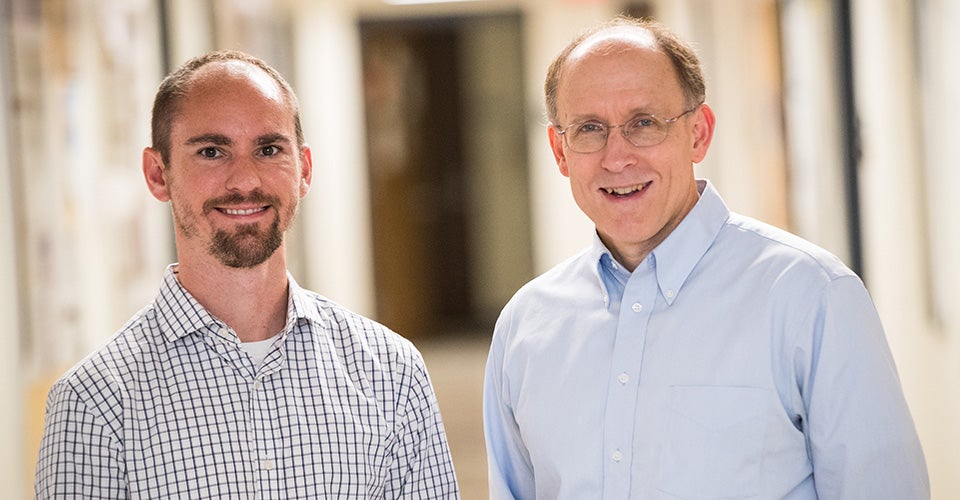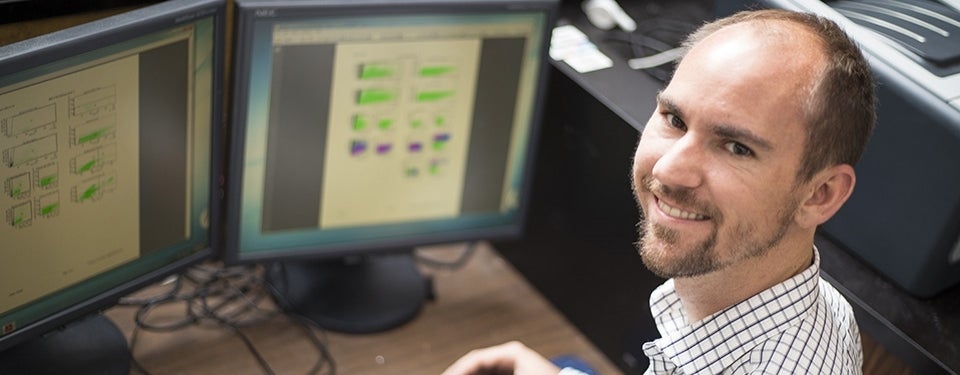SUITED TO A 'T'
Doctoral student's research could lead to treatment of MS, other diseases
Like many great scientific discoveries, Daniel Wilkinson’s came almost by accident.
As part of his doctoral research at East Carolina University, Wilkinson was working on a way of creating regulatory T cells, which are used in the treatment of autoimmune diseases, such as multiple sclerosis. But Mark Mannie, Wilkinson’s supervisor and a professor in the Brody School of Medicine’s Department of Microbiology and Immunology, said the results of Wilkinson’s experiments kept coming out differently than what they were expecting.
“He was getting information that didn’t make any sense,” Mannie said. “We were going over it, and it became apparent that what we were trying to do, the opposite was happening. And that became our ‘Eureka!’ moment. We then realized what was really going on and the potential of that.”
T cells are cells in the body that attack infectious organisms, such as viruses and parasites. But sometimes, the T cells become confused and will attack healthy parts of the body, leading to autoimmune conditions such as MS and Type 1 diabetes. Most people don’t get autoimmune diseases because of a subset of T cells called “regulatory T cells” that protect the body.
Scientists don’t have a lot of knowledge when it comes to how regulatory T cells work, because they are very malleable and are difficult to cultivate and study.
Wilkinson, a Charlotte native who got his bachelor’s degree from the University of North Carolina at Chapel Hill, has figured out a way to replicate the regulatory T cells through an in-vitro process.
“Scientists who study these cells get very frustrated because it’s very difficult to grow these cells in a culture tube because they tend to be unstable in that type of environment, and we don’t know why,” Mannie said. “What Daniel has done is figure out a way to grow these cells in such a way that they are stable and maintain their identity. It’s the foundation where we might be able to use these cells therapeutically to treat autoimmune disease.”
Wilkinson said, “With regulatory T cells, they can become unstable and actually make disease worse. I basically developed a method that allows us to generate a large number of these regulatory T cells and expand them in-vitro without them changing. To our knowledge, we’re the first laboratory to accomplish this feat.”
Wilkinson has a provisional patent on the process, and he and Mannie are authoring a paper on their work. Ultimately, the goal is to license the technology to a biotech company that can use the process to create a treatment for autoimmune conditions.
Mannie calls Wilkinson a model student and researcher.
“He’s very technically oriented – most of everything he does is a technical success, Mannie said. “He’s what most people would like, more students like him, because he can plug away at his research and do such a nice job. ‘Productive independence’ is the key term.”
As an undergraduate, Wilkinson wanted to study medicine to become a physician. But during his senior year, Wilkinson worked in an HIV research lab and that changed his outlook.
“That really opened me up to a whole new world of discovery, so the idea that I could be the first person to discover something is kind of intriguing to me and what led me to follow this path.”
That’s precisely what Wilkinson has accomplished with his work on regulatory T cells.
“At first, it was kind of shocking,” he said. “I didn’t know what I had done exactly, how significant it was, until Dr. Mannie told me that people had been trying to do this for decades. It’s kind of cool.”

Doctoral student Daniel Wilkinson and Mark Mannie, Wilkinson’s supervisor and a professor in East Carolina’s Department of Microbiology and Immunology
